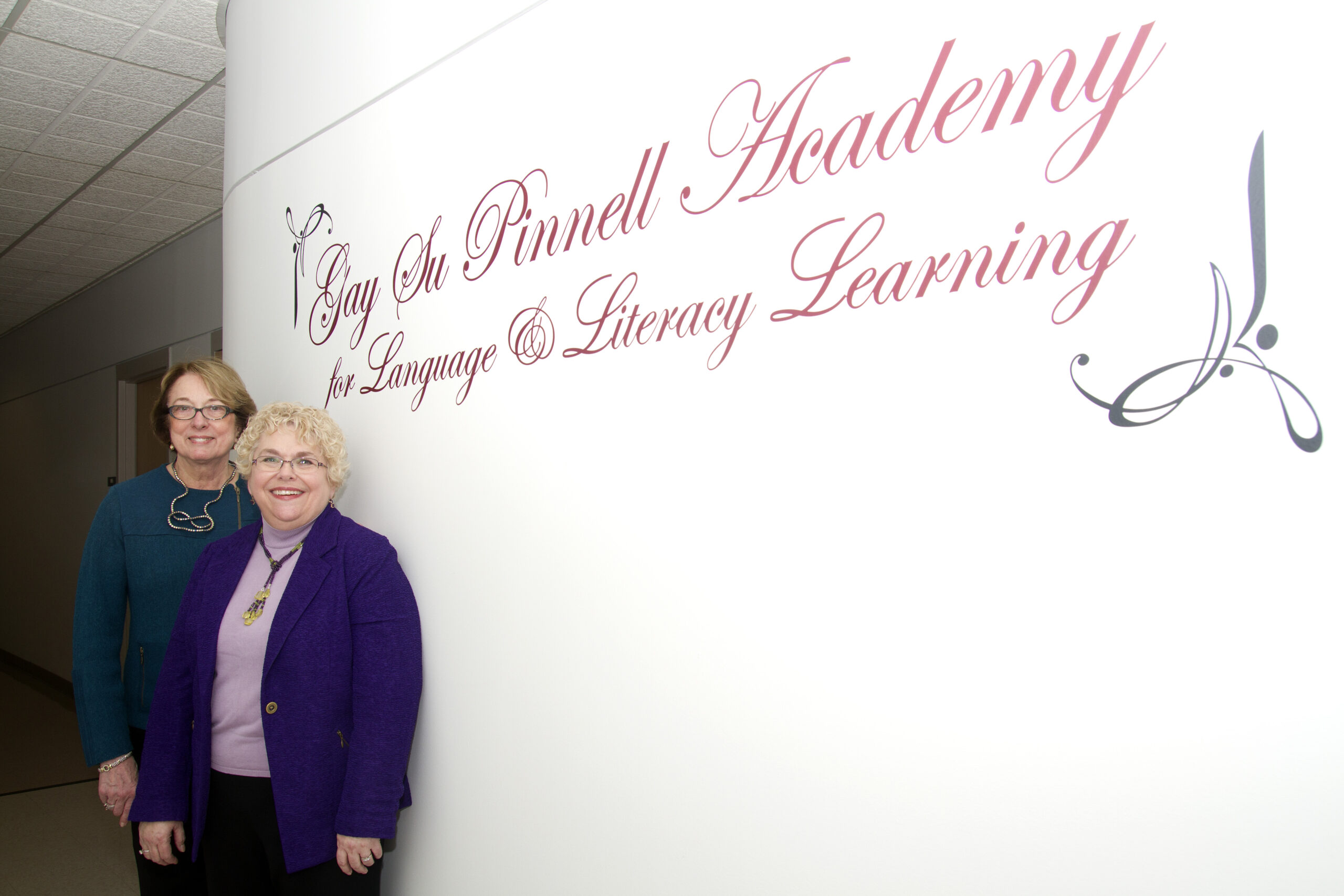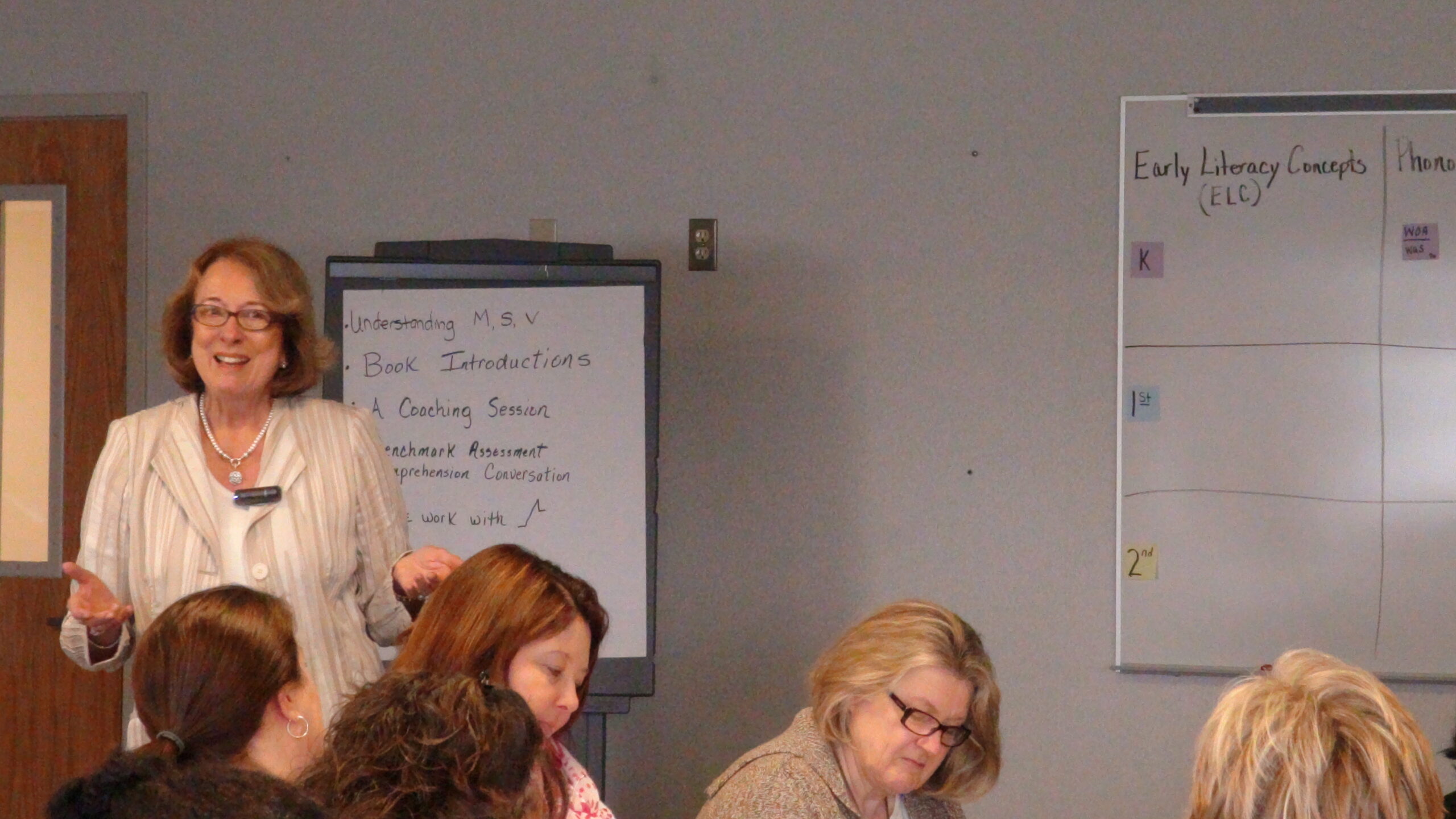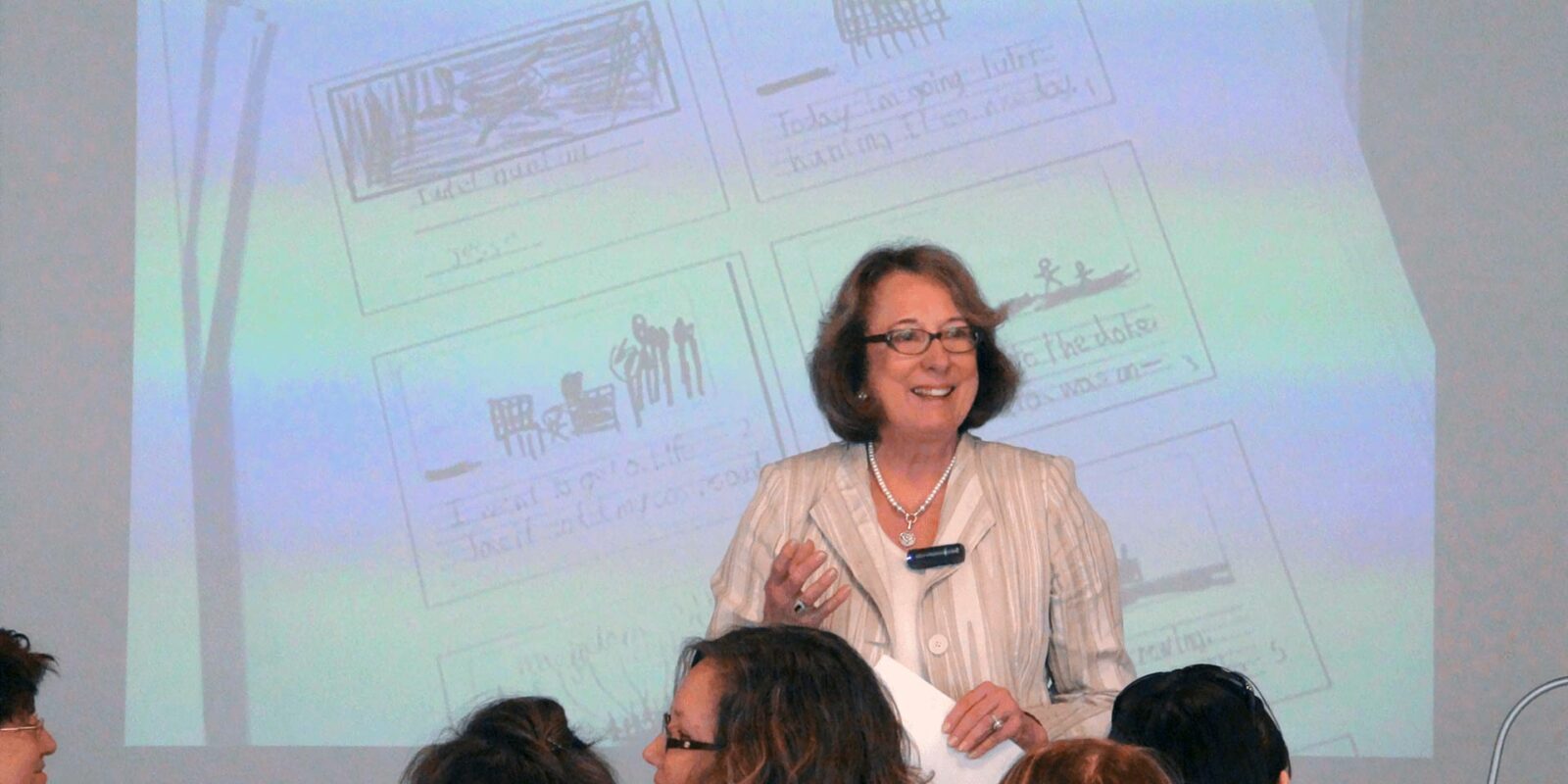As a preschooler, Gay Su Pinnell was hooked on books. But her small town of Portales, New Mexico, had only a tiny public library – one room in the courthouse – and no bookstores. There were, however, plenty of comic books.
Still, she couldn’t get enough, so to refresh her reading material more often, Pinnell organized a comic book trading operation with the kids on her street. She cherishes a vivid memory of teaching herself to read using those comic books featuring Wonder Woman, Archie, Little Lulu.
“I discovered that I could … recognize words,” she said. “I saw the word ‘the,’ the most ubiquitous word in the English language. So I took down one of my father’s (teaching) textbooks, and … every time I saw the word ‘the,’ I circled it in pencil across quite a few pages. It was a realization that there was a strong relationship between the letters you see and words you say.”
Those comic books exposed her to the complex syntax or grammar of written language, which is so helpful in learning to read. “After that, it was easy for me to learn,” she said.
Her parents, both teachers at the time, considered books sacred — not to be dog eared or written in. They didn’t appreciate her writing in an expensive book. But they were pleased to see their preschooler unlock the power of literacy.
Little did they know that she would one day help millions of children unlock that power.
A book lover’s quirks and strengths
People who love books but can’t get enough may seek clandestine access. During her junior high years, Pinnell’s school library had so few books for her age that each student could check out only one book per week.
She could consume an entire book in just one evening. She craved more.
So she volunteered to work in the school library during her free period, and each time, she would check out a book to take home. One day, she checked out 10 books all at once.
“It was very easy to discover because my name was on all those check-out cards,” she said.
The books were found in her locker. She had been busted.
“I wasn’t in bad trouble, but I had to give the books back,” she said. The worst part? Waiting for weeks while others read the books she most wanted.
Pinnell emphasizes the importance of reading books to children and having rich discussions — about them or anything else.
“My father liked to read and read poetry to me a lot … children’s poetry and adult poetry,” she said.
When the family went on vacation, her father invited her to choose 10 books — she read adult books at an early age. Five had to be about the history or culture of the place to which they were going.
“It might be New Mexico, Colorado or Arizona,” she said. “We would both read all those books and discuss them on the trip.”
These dialogues not only expanded her exposure to language but also helped shape her interest in children’s literacy early in life.

Becoming an elementary school teacher
Pinnell’s father eventually became the chair of education at the local Eastern New Mexico University, so her parents wanted her to attend college there. In the 1960s, nursing or teaching were the two approved careers for women that called for a college degree. She chose teaching.
“I have really good memories of teaching kids in classrooms,” she said. “I would do it again if I had the energy.”
As a young adult, she discovered one key to helping children enjoy learning when she taught swimming for the Red Cross at a Texas summer camp.
“Most of them — special needs kids — were frightened of the water,” she said. “So you get them in and let them play in the water, get to love it. Blow bubbles. Dive for things. They have to enter it in a playful way. Once they’re used to the water, then they learn to swim so rapidly.”
It’s the same with almost any type of learning, especially reading, Pinnell said. “It’s got to be engaging and active…. It needs to … use your brain in a very satisfying way. And (then) you can bring in everything you have to this very complex process of reading.”
Choosing Ohio State to study with the “greats”
Pinnell chose Ohio State for her master’s degree because it was and is well known for its experts in the study of children’s literature and literacy learning.
The experience opened a new world to her. She took courses with Charlotte Huck, whom she calls the country’s foremost expert in children’s literature in her time. She studied with Martha King, known for her interest in children’s language and writing. They inspired her to pursue a PhD.
Fast forward past her dissertation research, past the awarding of her PhD with Huck and King as her advisors, to 1984. As a young assistant professor in the college, Pinnell studied the work of Marie Clay, a developmental child psychologist and academic in New Zealand.
“When children fall behind in reading, you can see it happening,” Pinnell said. “Clay carefully observed children as they became literate and used her unique insights to form a powerful theory.”
Reading Recovery arrives in North America
Clay created Reading Recovery for struggling first-graders. It was so effective, and she was so respected at the University of Auckland, that New Zealand adopted it in schools nationwide.
“The idea is that even from the beginning, learners are very active and reading is quite complex,” Pinnell said. “Yes, they learn to recognize letters and connect them to sounds…. But readers also use their knowledge of the structure of language, and for children who’ve been read to, they have such a huge advantage. They use the meaning and everything they know.”
Intrigued, Pinnell traveled to New Zealand, met Clay and talked to Reading Recovery teachers. Back home, she told G. Robert Bowers at the Ohio Department of Education about Reading Recovery. He knew that Columbus Public Schools officials were concerned about serving young readers who were falling behind, so they began work to pilot a program.

The need and the intervention meshed, so with the department as a partner, Pinnell brought Reading Recovery to North America. Ohio State registered the trademark. Martha King wrote a proposal for a visiting professorship that brought Marie Clay and an associate to Ohio State to teach the intervention.
“I got two small grants, one from the National Council of Teachers of English, and the other from the International Reading Association,” Pinnell said. “Ohio’s Martha Holden Jennings Foundation and The Columbus Foundation made substantial contributions.”
She ran the pilot study in 1984. The next year, the Ohio legislature funded Reading Recovery and, with the department, she started the intervention in the schools.
Today, with many large studies to document its effectiveness, Reading Recovery has served more than 2.3 million first-graders in North America.
And it’s all thanks to Gay Su Pinnell and colleagues who worked with her — Carol Lyons and Diane DeFord.
Pinnell solidifies Ohio State funding for literacy outreach
Pinnell made the $7.5 million gift, the largest in the college’s history, because she felt Ohio State needed the funds now to continue its leadership in children’s literacy — both Reading Recovery and classroom teaching.
Her generosity creates four funds. “They provide permanent resources that will enable the college to attract really good personnel with job security,” she said.
The Pinnell Professor in Reading will be a regular faculty member dedicated to research as well as teaching, she said.
She named the Endowed Clinical Professorship for her colleague Mary Fried. “We need someone with her talent, or potential for her talent, full time, to understand the theory but to stay close to the actual work with kids in the field,” she said.
Her vision for the Literacy Collaborative Endowed Training Fund is “to provide a permanent position … (for) a very skilled master teacher who can provide leadership and ongoing professional learning for classroom teachers of language and literacy.”
The fourth fund can be used to pay staff or meet other expenses as needed, Pinnell said. Because of the pandemic, some of the work that generated income to the project had to be cancelled. They switched a portion to online, but not all of it can be accomplished in that way.
“The university is going through a very lean time,” Pinnell said, “but I hope to keep some of the really valuable work alive.”
The little girl who loved books is now a retired professor, but she continues to pursue her life’s goal of unlocking the power of literacy for children.

